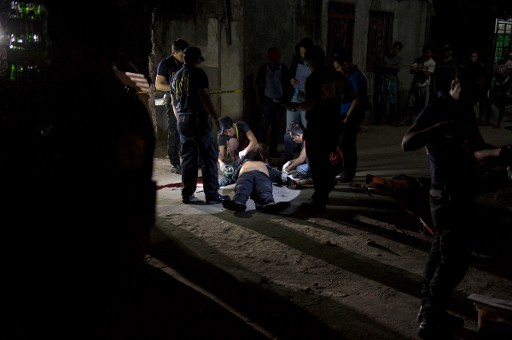Duterte‘most responsible’ for drug slays

This picture taken on January 18, 2017, shows policemen investigating a body of an alleged drug user on the ground after an unidentified gunmen shot him dead in Manila. AFP PHOTO
President Rodrigo Duterte, as head of state, is “most responsible” for the wave of extrajudicial killings in his administration’s campaign against illegal drugs, Caloocan Bishop Deogracias Iñiguez said on Thursday.
“We can say that the President is most responsible because of command responsibility,” Iñiguez said in an interview after he celebrated Mass for the victims of Mr. Duterte’s war on drugs at Our Lady of Victory Chapel in Potrero village, Malabon. “I can say that he is involved, that’s why we are appealing to the President to respect human rights.”
Concelebrated Mass
Fifteen priests concelebrated the Mass with Yñiguez in support of the families of the victims.
The Mass was held a day after London-based Amnesty International released its report on its investigation of the extrajudicial killings, with the conclusion that the killings were “systematic, planned and organized” and that police received money to kill drug users and pushers or hired assassins to kill drug addicts and traffickers.
Article continues after this advertisementThe sponsors said Masses were also celebrated in France, the United States and Papua New Guinea in support of the local action for an end to the killings.
Article continues after this advertisementAbout 250 relatives of 70 drug war victims attended the Mass. All of them came from the poorest neighborhoods in Metro Manila.
Rolando Paredes, who lost a son in Mr. Duterte’s war on drugs, said the drop in the number of killings since the antinarcotics campaign was suspended on Monday only proved that killings were “state-sponsored.”
Only three people, one in Pateros and two in Pasig City, were killed by motorcycle-riding gunmen on Tuesday night.
“What does that tell you? With one snap of the fingers they can stop the deaths,” Paredes said.
Lina Araneta-Santiago, whose family owns the subdivision where the chapel is located, said the Mass was celebrated to give face and name to the victims of Mr. Duterte’s war on drugs.
“You cannot kill people as if they were flies,” she said. “We’re all human beings and we all deserve to be treated with dignity.”
“And look at them,” Santiago said, motioning to the relatives of the victims, “all of them are poor.”
Where is the cardinal?
But most of all, she said, the point of holding the Mass was to ask the Catholic Bishops’ Conference of the Philippines: “Where is the cardinal?”
Santiago said the Church’s response to the killings and the relatives’ despair had been “lukewarm.”
Manila Archbishop Luis Antonio Cardinal Tagle, she said, had not visited the families of the victims and has not issued a strong statement for the whole Church.
“The Church has not done anything to stop the killings,” Santiago said. “Instead, you see the cardinal’s pictures in magazines, or a photo of him with a beauty queen.”